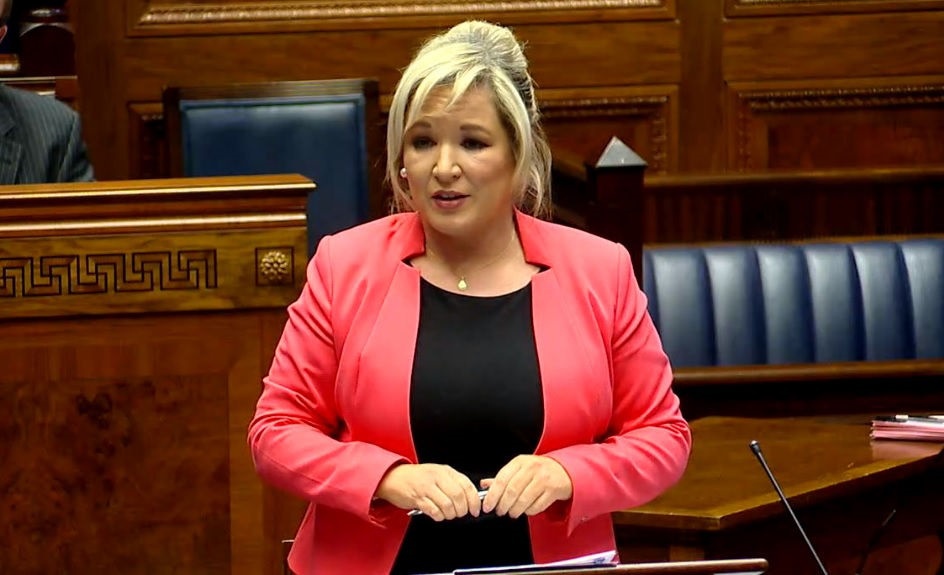
By Michael McHugh, PA
Michelle O’Neill addressed the Assembly in her role as a senior member of Sinn Fein rather than deputy First Minister in the debate around abortion.
It comes as the DUP's Paul Givan introduced a bill to the Assembly today to propose a new law to prevent abortions being carried out in cases of non-fatal disabilities.
Ms O'Neill said: “This is the thin end of the wedge and attempting to reopen a debate that has already been had around women’s health care provision.
“I am here to give a voice to those women who find themselves in incredibly difficult and very vulnerable circumstances.”
She said the DUP and the UUP Health Minister Robin Swann were “failing” women by refusing to commission services which were legislated for long ago.
“Women are entitled to have compassionate health care,” she said.
“It is a human right to have compassionate health care and should be the focus of what this Assembly is concerned about.”

Michelle O'Neill
Earlier, the DUP said people with disabilities like Down’s Syndrome should not be less worthy of protection from abortion.
The party is opposed to terminations and has proposed a new law to prevent them being carried out in cases of non-fatal disabilities.
Sinn Fein will this week formally ask Stormont ministers to commission abortion services in Northern Ireland.
Party president Mary Lou McDonald accused the DUP and Ulster Unionists of blocking the change, two years after legislation was passed at Westminster.
Senior Democratic Unionist Paul Givan told the Stormont Assembly: “This bill is about tackling the attitudes and myths that lead to failures to provide high-quality support and care.”

DUP's Paul Givan proposed the bill in the Assembly today.
He said discriminatory attitudes were still present.
“This is not something that our Assembly should tolerate.”
Northern Ireland’s previously restrictive laws were changed by MPs at Westminster in 2019 at a time when the Stormont administration was collapsed.
The laws allow abortion in all circumstances up to 12 weeks.
Terminations are permitted up to 24 weeks when there is a risk to the woman’s physical or mental health.
There is no time limit in cases of fatal foetal abnormality or when there has been a diagnosis of a serious physical or mental impairment that would cause a serious disability.
Abortions post 24 weeks in those circumstances are extremely rare.
Mr Givan said Downs syndrome life expectancy had increased to 50 or 60 years.
He lambasted the 2019 legislation.
“This sends out the message loud and clear that the lives of people with disabilities are less valuable and worthy of protection than the lives of people without disabilities, a law which fosters this thinking in 2021 is completely unacceptable.”
Individual health trusts have set up temporary early medical abortion pathways but Northern Ireland-wide services have not yet been commissioned by the Department of Health.
Minister Robin Swann has argued that, as a controversial issue, it is for the Executive to agree to set up the services.
Sinn Fein Communities Minister Deirdre Hargey is bringing forward a proposal to Stormont’s Executive this week to ensure services are delivered.
She said: “This is a crude attempt to roll back legislation in line with international human rights requirements.
“Despite this law being enacted to advance women’s health care it has not been implemented by the health minister.”

Paula Bradshaw of the Alliance Party
The Alliance Party’s Paula Bradshaw said the DUP’s measure could see more women travelling for healthcare.
She said: “The whole premise of the Bill rests on a misinterpretation.
“It is legislation that will be overturned because it is based on a false premise.”
She added: “It takes people on an emotional journey then fails to deliver on the premise because it will be overturned and no difference will be made.”
She said the Bill did nothing to change public attitudes to those with Down’s Syndrome.
Sinn Fein vice-president Michelle O’Neill said her party’s Assembly members would abstain from the vote.
She expressed “deep unease” at the “narrow focus” of the Bill.
“Women are entitled to modern and compassionate health care,” she said.
She added: “The sponsor of the Bill is focused on rolling back the legislation.”
She said it ignored the failure to introduce abortion services in Northern Ireland.



 Omagh inquiry told pace of disclosure ‘must increase’
Omagh inquiry told pace of disclosure ‘must increase’
 Man, 34, appears in court charged in relation to attack on Islamic Centre
Man, 34, appears in court charged in relation to attack on Islamic Centre
 Politicians urge calm after second night of Londonderry violence
Politicians urge calm after second night of Londonderry violence
 Kneecap rapper faces charges for alleged support of terrorist group, court told
Kneecap rapper faces charges for alleged support of terrorist group, court told